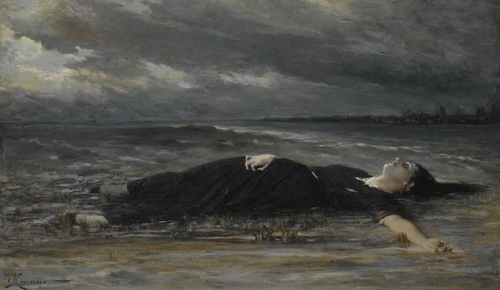
Apparently, Strauss didn't really want to write his Drei Lieder der Ophelia; neither these Lieder nor any other, but he was bound by contract. By 1906, the composer had given over the rights of his next six songs (Strauss' songs sold very, very well), to his publishers, Bote & Bock, but it turns out that this contract came about at the end of his time as a song writer; Salome was premiered in 1905 and then, he stopped writing songs. Years went by and I can imagine his editors asking patiently: "what about our songs, Richard"? When Bote & Bock were fed up of waiting, they took the case to court and won. That wasn't the only conflict that the composer and the editors had, and maybe that's why Strauss tried to pay his debt with a "musical vengeance " which the publishers, in turn, paid back (I'll talk about it next season); finally, in 1918, Strauss sent to Bote & Bock his Opus 67, a collection of six Lieder: the three Ophelia's Lieder and other three with poems by Goethe.
These lieder, as most of the thirty ones that he finally composed that year (including the Brentano Lieder, Op. 68, including Amor, which we heard some time ago), are different to the ones written during his "Pauline time", between 1887 and 1905; in Ophelia's songs, we hardly hear that great late Romanticism we're are used to. His Ophelia is far away from his own songs and also from Brahms' Ophelia, and that's why I wanted to listen to both; it's always interesting to hear different musical versions from the same poem, and, in this case, we may wonder how those major social changes between 1873 (when Brahms wrote his cycle) and 1918, could have influenced Strauss' music.
The most dramatic change was, definitely, the terrible war that had just ended by 1918; it turned the world upside down. But from a strictly musical point of view, the turn of the century had brought many new ideas; although Strauss wanted to keep himself isolated from vanguards, he couldn’t turn a blind eye to his time. The turn of the century was also the time of Freud's theories about sexuality, and Ophelia, that character that in Brahms' time was seen as a weak character, bound to the ideal of a fragile woman, in Strauss' time tended to be seen as a stronger woman, more aware of her conflicts. I don't know if Strauss read Freud, but he had certainly deeply worked his representation of a different woman; just think of Salome or Elektra. Maybe for some of these reasons, or for a combination of all of them, or because changes were in the air, Strauss's Ophelia is very different from that of Brahms’.
From Brahms, we heard Auf morgen ist Sankt Valentinstag, the third song in his cycle; we're hearing now the same song by Strauss, which is his second. There are two differences between both texts. The first one is Shakespeare's translator; Brahms used the translation by August von Schlegel (brothers Schlegel are often mentioned lately), from 1797, and Strauss that of Karl Simrock, from 1837. The second difference between the texts is that Strauss goes beyond Brahms. The latter strictly composed Ophelia's song, which speaks of a maid going into a man’s bedroom on Valentine's Day; Strauss adds the following Ophelia's words to his song, explaining that the man broke his marriage vows because the girl "had come to his bed". That is, Strauss' is much more explicit about Ophelia's conflict (those verses in Brahms could very well have been omitted in those performances for which he wrote his songs; it was quite common to cut those "endangered" parts of the play).
Strauss' music reflects the new way to understand Ophelia's personality. When we hear Brahms' song we hear a lovely traditional song, which exactly what it's at first reading; when we hear Strauss' song we clearly hear the disturbed girl. As I said, this is not of the many kind, lovely songs by this composer. And it doesn't matter at all, am I right? Our version will be that of Christiane Karg and Malcolm Martineau.
Guten Morgen, ’s ist Sankt Valentinstag,
So früh vor Sonnenschein
Ich junge Maid am Fensterschlag
Will euer Valentin sein.
Der junge Mann tut Hosen an,
T¨at auf die Kammerthür,
Ließ ein die Maid, die als Maid
Ging nimmermehr herfür.
Bei Sankt Niklas und Charitas!
Ein unverschämt Geschlecht!
Ein junger Mann thut’s, wenn er kann,
Fürwahr, das ist nicht recht.
Sie sprach: Eh’ ihr gescherzt mit mir,
Verspracht ihr mich zu frei’n.
Ich bräch’s auch nicht, bei’m Sonnenlicht,
Wär’st du nicht kommen herein.
Tomorrow is Saint Valentine’s day,
All in the morning betime,
And I a maid at your window,
To be your Valentine.
Then up he rose, and donned his clothes,
And dupped the chamber door.
Let in the maid that out a maid
Never departed more.
By Gis and by Saint Charity,
Alack, and fie, for shame!
Young men will do ’t, if they come to ’t.
By Cock, they are to blame.
Quoth she, “Before you tumbled me,
You promised me to wed.”
He answers,
“So would I ha' done, by yonder sun,
An thou hadst not come to my bed.”












